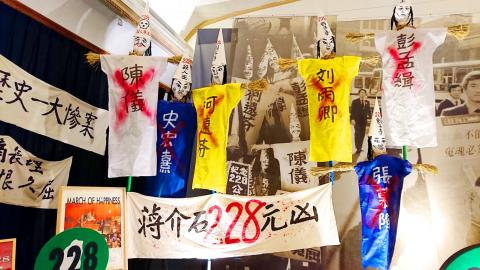The Ministry of the Interior is proposing the abolition of regulations guiding portrayals of former president Chiang Kai-shek (蔣介石), Minister of the Interior Yeh Jiunn-rong (葉俊榮) said yesterday at the Legislative Yuan.
Democratic Progressive Party (DPP) Legislator Kolas Yotaka asked Yeh about the Notice Regarding the Construction of Statues for the Honorable Former President Chiang (塑建總統 蔣公銅像注意事項) which was promulgated by the ministry in 1975, shortly after Chiang’s death.
The notice requires statues to portray Chiang as being “amiable,” “dignified” and bearing “revolutionary spirit which includes compassion, wisdom, bravery, perseverance and optimism.”

Photo: Chen Yu-fu, Taipei Times
The notice requires the addition of Chiang’s final words to the base of statues and includes instructions for environment and height, mandating pedestals stand at least 2m tall.
“Anyone viewing the statue is supposed to have to look up to Chiang,” Kolas said.
“These kind of regulations reflect the reality of the development process Taiwan has gone through,” Yeh said, adding that he had not been aware of the regulations’ continued existence.
“I want to abolish it quickly,” he said, assuming it remains valid.
The future of public statues of Chiang has been a point of contention as the DPP government pushes for transitional justice legislation, with numerous acts of protest vandalism committed against Chiang statues every year.
Many statues have been removed, with more than 200 currently interned at Chiang’s Cihu Mausoleum in Taoyuan, where they were moved after former sites disposed of them.
Meanwhile, when asked if he would continue to represent the central government in attending annual sacrifices to Koxinga (鄭成功) next month, Yeh said his schedule has yet to be determined.
Kolas, an Amis, called for Yeh to refrain from participation to show cultural sensitivity, because Koxinga’s conquest of the island marked the beginning of Han Chinese rule and the subsequent displacement of Aboriginals.

Taiwanese can file complaints with the Tourism Administration to report travel agencies if their activities caused termination of a person’s citizenship, Mainland Affairs Council Minister Chiu Chui-cheng (邱垂正) said yesterday, after a podcaster highlighted a case in which a person’s citizenship was canceled for receiving a single-use Chinese passport to enter Russia. The council is aware of incidents in which people who signed up through Chinese travel agencies for tours of Russia were told they could obtain Russian visas and fast-track border clearance, Chiu told reporters on the sidelines of an event in Taipei. However, the travel agencies actually applied

New measures aimed at making Taiwan more attractive to foreign professionals came into effect this month, the National Development Council said yesterday. Among the changes, international students at Taiwanese universities would be able to work in Taiwan without a work permit in the two years after they graduate, explainer materials provided by the council said. In addition, foreign nationals who graduated from one of the world’s top 200 universities within the past five years can also apply for a two-year open work permit. Previously, those graduates would have needed to apply for a work permit using point-based criteria or have a Taiwanese company

The Shilin District Prosecutors’ Office yesterday indicted two Taiwanese and issued a wanted notice for Pete Liu (劉作虎), founder of Shenzhen-based smartphone manufacturer OnePlus Technology Co (萬普拉斯科技), for allegedly contravening the Act Governing Relations Between the People of the Taiwan Area and the Mainland Area (臺灣地區與大陸地區人民關係條例) by poaching 70 engineers in Taiwan. Liu allegedly traveled to Taiwan at the end of 2014 and met with a Taiwanese man surnamed Lin (林) to discuss establishing a mobile software research and development (R&D) team in Taiwan, prosecutors said. Without approval from the government, Lin, following Liu’s instructions, recruited more than 70 software

Taiwanese singer Jay Chou (周杰倫) plans to take to the courts of the Australian Open for the first time as a competitor in the high-stakes 1 Point Slam. The Australian Open yesterday afternoon announced the news on its official Instagram account, welcoming Chou — who celebrates his 47th birthday on Sunday — to the star-studded lineup of the tournament’s signature warm-up event. “From being the King of Mandarin Pop filling stadiums with his music to being Kato from The Green Hornet and now shifting focus to being a dedicated tennis player — welcome @jaychou to the 1 Point Slam and #AusOpen,” the